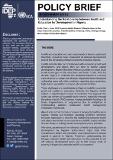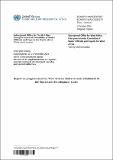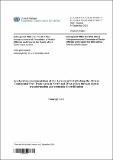Our Institutional Repository is currently undergoing an upgrade. The platform remains accessible for search and consultation. However, user login and content submissions are temporarily disabled. We appreciate your understanding.
Study of the present and potential use of socio-economic indicators in planning

View
Download
Published
1984-01Author(s)/Corporate Author (s)
Dieye, M. Abdoulaye Mar;United Nations. Economic and Social Council;
United Nations. Economic Commission for Africa;
Metadata
Show full item recordAbstract
In the economic literature of the last 20 years the question of socio-economic indicators has occupied a relatively important place. As a new idea, it has been surrounded by the traditional aura of confusion and misunderstanding which often accompanies such ideas as they; make their way in the world of social science. If we read the economic literature and the reports and resolutions of international meetings on this subject, we shall see that there are several possible interpretations of the concept of socio-economic indicators. In this, document we do not intend to become involved in this debate. However, it may be said that a consensus is emerging to the effect that a socioeconomic indicator (SEl) may be defined as the best possible statistic, or statistical function, chosen to measure the state and evolution of a complex socio-economic phenomenon.
Citation
“Dieye, M. Abdoulaye Mar; United Nations. Economic and Social Council; United Nations. Economic Commission for Africa (1984-01). Study of the present and potential use of socio-economic indicators in planning. UN. ECA Expert Consultation on a System of Socio-economic Indicators for African Planners (1984: Jan. 23 - 27: Addis Ababa, Ethiopia).. Addis Ababa :. © UN. ECA,. https://hdl.handle.net/10855/17720”Conference
UN. ECA Expert Consultation on a System of Socio-economic Indicators for African Planners (1984: Jan. 23 - 27: Addis Ababa, Ethiopia).Collections
- Organizational Management [4956]
Related items
Showing items related by title, author, creator and subject.
Understanding the Relationship between Health and Education for Development in Nigeria
United Nations. Economic Commission for Africa; United Nations. Economic Commission for Africa. African Institute for Economic Development and Planning(IDEP); United Nations. Economic Commission for Africa; United Nations. Economic Commission for Africa. African Institute for Economic Development and Planning(IDEP)
“Kalu, Chris U.; Abdul-Raheem, Tajudeen; United Nations. Economic Commission for Africa; United Nations. Economic Commission for Africa. African Institute for Economic Development and Planning(IDEP); United Nations. Economic Commission for Africa; United Nations. Economic Commission for Africa. African Institute for Economic Development and Planning(IDEP) (2018-05). Understanding the Relationship between Health and Education for Development in Nigeria. Policy Brief. No. 007, 4 p.: ill.. Addis Ababa:. © UN. ECA,. https://hdl.handle.net/10855/49836”
Report on progress made by West African states towards attainment of the sustainable development goals
United Nations. Economic Commission for Africa; United Nations. Economic Commission for Africa. Subregional Office North Africa (SRO-NA); United Nations. Economic Commission for Africa. Subregional Office West Africa (SRO-WA); United Nations. Economic Commission for Africa; United Nations. Economic Commission for Africa. Subregional Office North Africa (SRO-NA); United Nations. Economic Commission for Africa. Subregional Office West Africa (SRO-WA)
“United Nations. Economic Commission for Africa; United Nations. Economic Commission for Africa. Subregional Office North Africa (SRO-NA); United Nations. Economic Commission for Africa. Subregional Office West Africa (SRO-WA); United Nations. Economic Commission for Africa; United Nations. Economic Commission for Africa. Subregional Office North Africa (SRO-NA); United Nations. Economic Commission for Africa. Subregional Office West Africa (SRO-WA) (2024-10). Report on progress made by West African states towards attainment of the sustainable development goals. Addis Ababa. © UN. ECA,. https://hdl.handle.net/10855/50517”
Accelerating implementation of the Agreement Establishing the African Continental Free Trade Area in North and West Africa through digital transformation and economic diversification : Concept note
United Nations. Economic Commission for Africa. Subregional Office West Africa (SRO-WA); United Nations. Economic Commission for Africa. Subregional Office South Africa (SRO-SA); United Nations. Economic Commission for Africa; United Nations. Economic Commission for Africa; United Nations. Economic Commission for Africa. Subregional Office South Africa (SRO-SA); United Nations. Economic Commission for Africa. Subregional Office West Africa (SRO-WA)
“United Nations. Economic Commission for Africa. Subregional Office West Africa (SRO-WA); United Nations. Economic Commission for Africa. Subregional Office South Africa (SRO-SA); United Nations. Economic Commission for Africa; United Nations. Economic Commission for Africa; United Nations. Economic Commission for Africa. Subregional Office South Africa (SRO-SA); United Nations. Economic Commission for Africa. Subregional Office West Africa (SRO-WA) (2024-09-24). Accelerating implementation of the Agreement Establishing the African Continental Free Trade Area in North and West Africa through digital transformation and economic diversification : Concept note. Addis Ababa:. © UN. ECA,. https://hdl.handle.net/10855/50640”



